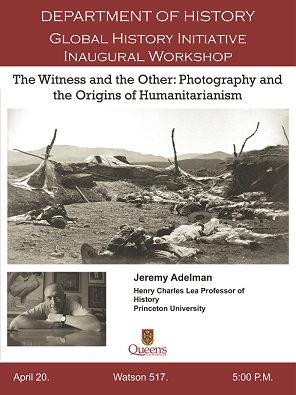Global Legal Regimes: Beyond Imperial Frames

Inaugural workshop of the Global History Initiative, Queen’s University, Kingston
How do the concepts and methods of global history illuminate, enrich and complicate legal history scholarship? What are the global processes, concepts and problems that might be illuminated through a legal archive? How does the study of legal cases shed light on cultural, economic and political interactions between societies and nations? How do legal regimes enable, and restrict, the movement of people around the globe?
In the inaugural event of the Queen’s Global History Initiative, we invited presenters to consider the law as an archive for illuminating global problems and concepts, to study legal regimes as contact zones that forge transnational interactions and connections, and to think through the law to track the movements of peoples, concepts, goods and ideas in time and space.
Building on the explosion of legal history scholarship in Asia, Africa, the Middle East and Latin America, we explored how we might conceptualize legal regimes in global history beyond national, imperial and colonial frames. What does a global reframing offer to scholars working on these regions? How might an understanding of legal pluralism, jurisdictional politics, and legal subjectivities be transformed when the frame of reference is freed from fixed geospatial and imperial units? We welcomed papers that were located in a particular geographical context, or a local archive, but illuminated global phenomena or legal norms – rights, custom, evidence, oaths, family, sovereignty – to name a few.
The workshop was held on April 20-21 at Queen’s University in Kingston, Ontario, with a keynote delivered by Prof. Jeremy Adelman, the Henry Charles Lea Professor of History and Director of the Global History Lab at Princeton University.
Ishita Pande and Amitava Chowdhury
(on behalf of the Global History Initiative, Queen's University)